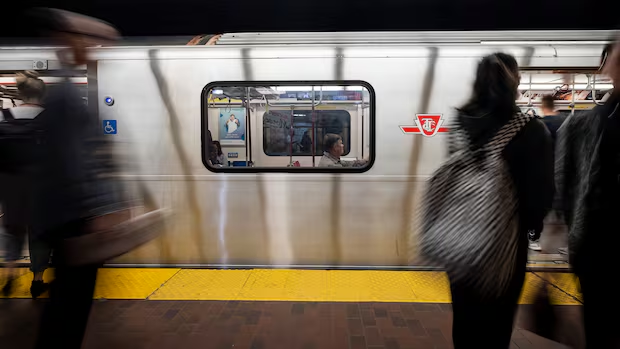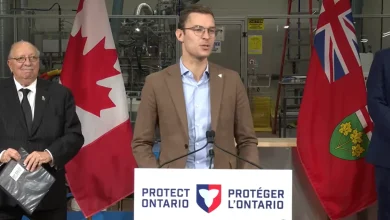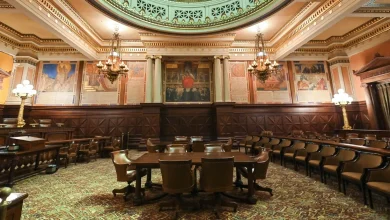TTC proposing fare freeze in 2026, while capital budget concerns persist

Listen to this article
Estimated 5 minutes
The audio version of this article is generated by text-to-speech, a technology based on artificial intelligence.
The Toronto Transit Commission wants to freeze fares for a third straight year, while the city agency can’t afford the repairs needed to keep the system riders rely on fully functional over the next decade.
The intention to leave fare prices where they are was shared Tuesday as part of a presentation on the 2026 operating budget to the commission’s strategic planning committee.
The presentation also covered the capital budget and state of good repair backlog, which essentially means work to keep the transit agency’s vehicles and infrastructure in good shape.
Committee member Coun. Dianne Saxe said “it is close to miraculous” that the TTC found a way to continue freezing fares while planning to improve service. But she said that’s only possible with a $1.4 billion subsidy from Toronto — a spend the city itself can barely afford.
“Even with that, it’s clear we are in very big financial problems,” she said during the meeting, referring to an unfunded backlog of infrastructure and equipment upkeep work in the capital budget.
“These are urgent repairs we can’t pay for that are essential for being able to sustain the system,” Saxe said.
WATCH | How time is catching up to the streetcar — and slowing it down:
How time is catching up to the streetcar — and slowing it down
An icon of transportation history in Toronto, the city’s streetcar system is now struggling to balance reliability with the necessary upkeep of its aging infrastructure.
She said the TTC and city politicians need to take every opportunity to share that message with higher orders of government in the hopes of accessing more funding.
The unfunded state of good repair backlog Saxe referred to has projected to grow to $6.1 billion in the next 10 years, staff said. The city has been working to reduce that backlog, including spending $500 million on vehicle fleet overhaul with money freed up through a deal Mayor Olivia Chow brokered between the city and province in 2023.
But Tuesday’s presentation said the unfunded need has risen due to increased procurement costs for overhaul programs.
To attract new riders and keep people confident in the system, the TTC needs to keep spending on infrastructure and asset upkeep, the meeting heard, otherwise it could see emergency maintenance and service interruption.
The presentation to the committee was a high-level overview of the budget, before it goes through the TTC board for approval at a later date.
TTC using half of reserves to make budget work
To be able to freeze fares and do everything else the transit agency wants to do in its 2026 operating budget, the TTC will have to draw on more than half of its reserves to make the 2026 fiscal document work, the meeting heard.
About $35 million of the TTC’s $3 billion 2026 operating budget will be drawn from the transit agency’s reserves. While that draw might represent a small portion of the total budget, the total reserve sits at $68 million, with staff telling the meeting they will look at replenishing it in 2027.
In September, the committee heard the TTC needed to find $232 million to pay for next year’s budget. The draw from reserves is part of that work, with staff also finding savings in areas of the TTC’s operations that wouldn’t impact service for riders.
Fare freeze ‘what our riders need right now’
The budget proposes funding for a two per cent increase in service, which includes fully funding peak service added to Line 1 and Line 2 earlier this fall.
Coun. Alejandra Bravo, who chairs the strategic committee, said the budget proposal was crafted by TTC staff in a difficult economic situation.
“[A fare freeze] is what our riders need right now at a time when there’s an affordability crunch and huge youth unemployment rate,” Bravo said in an interview with CBC Toronto after the meeting.
While the TTC wants to help ease some of those economic pressures for Torontonians, they are having an impact on the transit system’s revenue.
WATCH | TTC renames Dundas Station to TMU Station:
Toronto’s Dundas Station renamed TMU Station
The TTC is changing the name of Dundas Station to TMU Station. CBC’s Naama Weingarten has reaction from commuters and students.
The TTC has seen a rides increasing since 2022, but staff said ridership growth appears to be plateauing. That’s something the transit agency is attributing to a slowdown in the job market, while return-to-office mandates failed to deliver the boost in ridership the TTC was expecting.
But the commission is expecting a small rise in ridership due to improved service from the transit priority lanes put in place on Dufferin and Bathurst streets, as well as during the 2026 FIFA World Cup.





